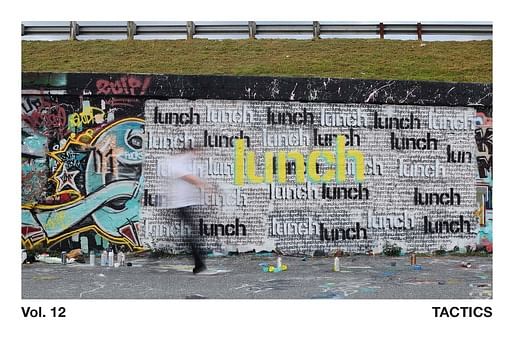
 Abstracts due Dec. 2, 2016; full submissions due Feb. 2, 2017.
Abstracts due Dec. 2, 2016; full submissions due Feb. 2, 2017.
Submit here: https://lunchdesignjournal.submittable.com/submit/70294/lunch-12-tactics
The city is at a critical moment—emerging spatial, ecological, and social crises have called into question the validity of established urban logics. As designers, we are uniquely equipped to act when the constructed frameworks of society inhibit progress. In the face of such systemic problems, designers can most effectively provoke concrete change by rejecting the rigid and conventional in favor of the tactical. Subversive and experimental in their nature, and informed by a pragmatic specificity, tactical operations transform our modes of perception and engagement. Through their transparency, these operations achieve a responsive and equitable built environment in which the inhabitant is not simply a user, but an empowered actor. Lunch seeks critical research, speculative design, and incisive built work that employs tactical problemsolving: invention through constraint, reconfiguration of accepted practices, and the urgency of the here and now.
We propose engagement on three fronts:
INFORMATION TACTICS: Data and technology are exploited in the name of optimization, creating a so-called “smart city” populated, but not operated by, its inhabitants. In what ways can we use information to create a more responsive city sustained by generative and visible processes?
ENGAGEMENT TACTICS: Conventional design methodology is opaque and inaccessible to those external to its practice. How can democratizing the means, methods, and products of design initiate a reflexive dialogue within and beyond the field? In what ways can reassessing accepted methodologies fuel novel forms of practice?
HYBRID TACTICS: Material, spatial, ecological, and programmatic hybridity can enhance the utility and longevity of design interventions. How can tactical operations capitalize on synergies to produce adaptive environments? How can a progressive understanding of the interrelation of the human and nonhuman inform the composition of the city?
We will consider two categories of submission: (1) essays of no more than 2500 words, supported by relevant visual and textual sources and (2) image-based work, with a narrative statement and captions totaling no more than 1000 words.
lunch is a design research journal edited and designed by students at the University of Virginia School of Architecture. Visit lunch-journal.com for our past volumes and more information.


No Comments
Block this user
Are you sure you want to block this user and hide all related comments throughout the site?
Archinect
This is your first comment on Archinect. Your comment will be visible once approved.